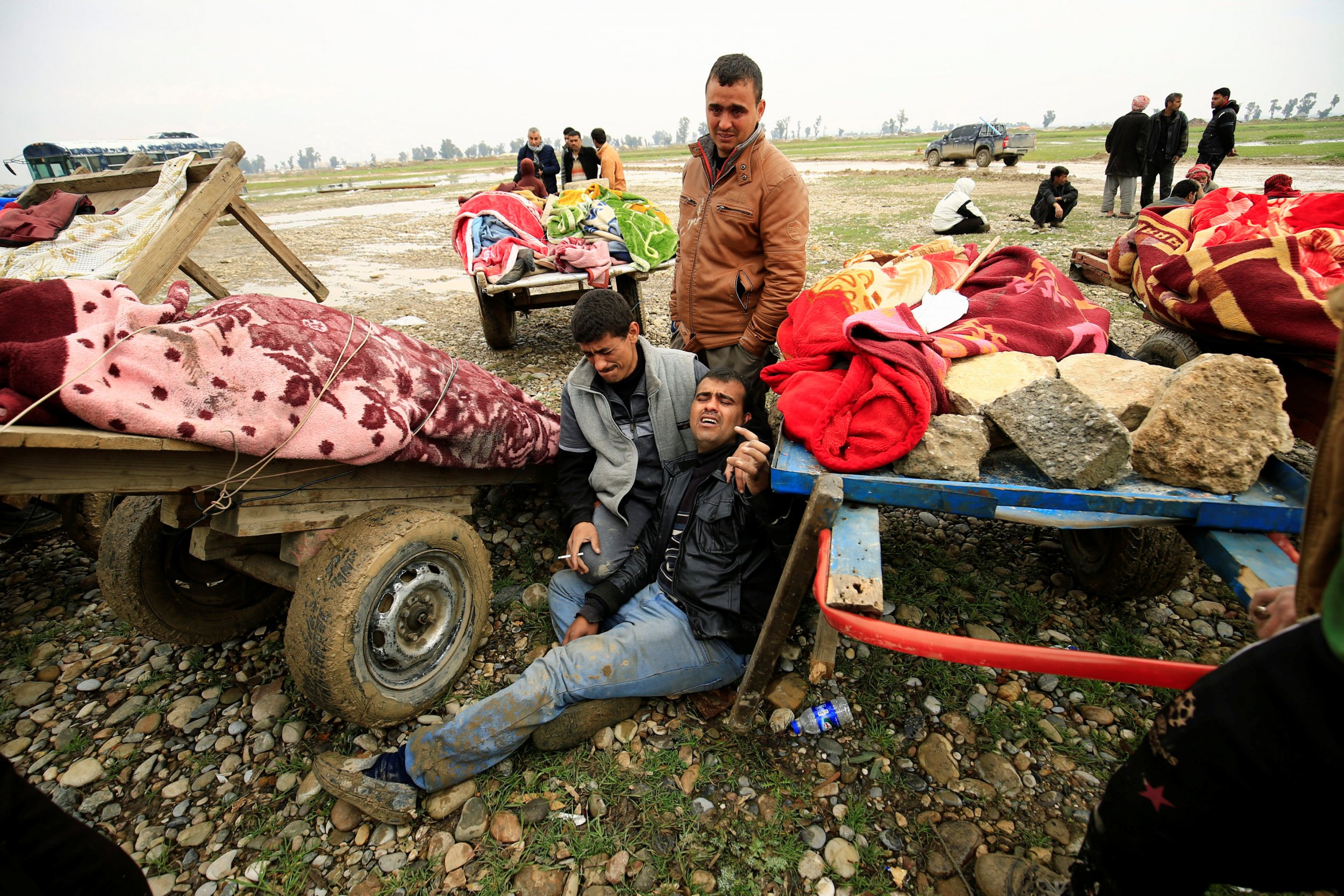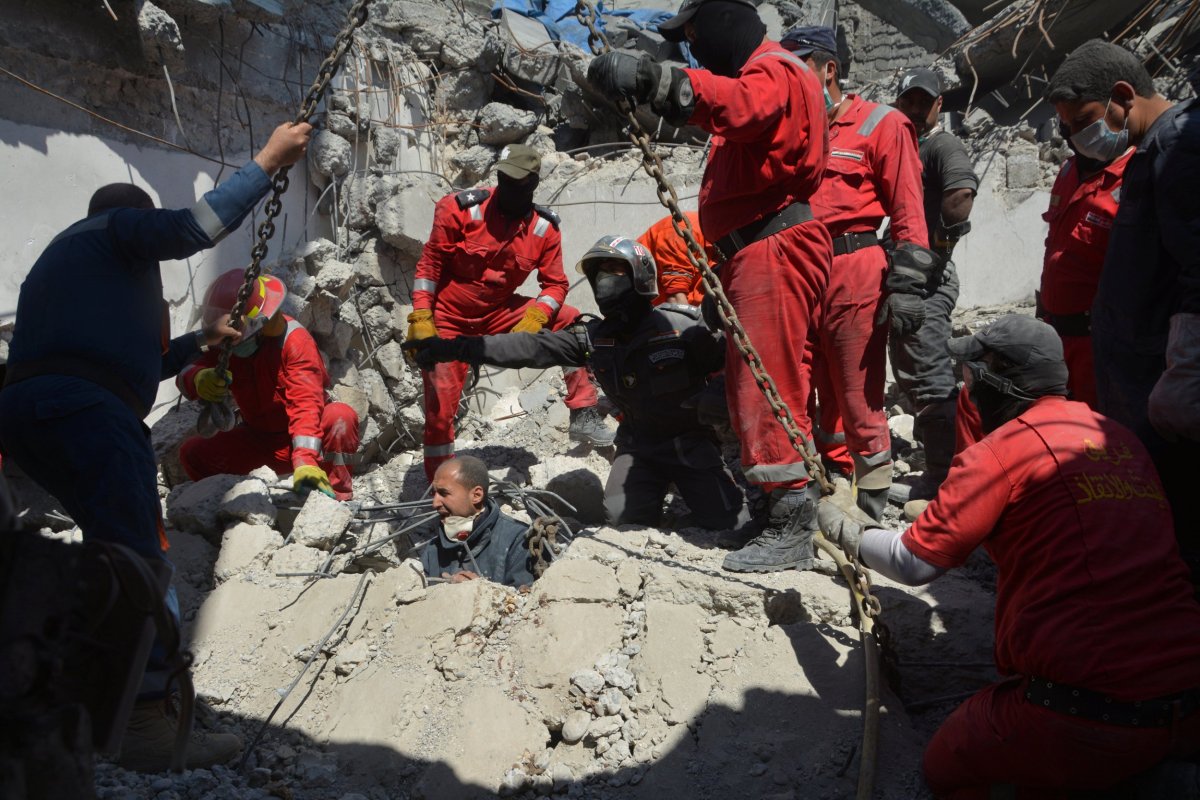
As the U.S.-led coalition continues to besiege the northern Iraqi city of Mosul with airstrikes in support of its Iraqi ground partners, reports have emerged of heavy civilian casualties in a March 17 coalition strike on the Mosul al-Jadida neighborhood in the Islamic State militant group (ISIS) bastion.
The blast was at least in part caused by a U.S.-led coalition strike, but a series of successive explosions may have amplified the damage.
Mosul remains in ISIS's hands but the coalition and Iraqi forces have liberated the eastern part of the city, and they are now focusing their sights on the western areas. The operation, which began in October, has left tens of thousands of war-weary civilians sandwiched between the brutality of ISIS, the ground fire of the Iraqi military and the airpower of Western coalition members.
The civilian casualties have been so numerous, the bloody stretchers so many, that they have forced a lull in the campaign, and investigations are continuing.
Here's what we know about the strike that is proving so controversial in the biggest battle against the jihadi group yet.
The Facts
Operator: U.S.-led coalition aircraft
Member nation: Unknown
Munitions model: Unknown
Date: March 17
Location: Mosul al-Jadida, neighborhood in west Mosul
Target: Islamic State "fighters and equipment," and ISIS-held structures (coalition statement)
Death toll: At least 140 (U.N. rights office)
Civilians killed since February 17: 307 (U.N. rights office)
Accusations of international law violations
Reports of civilian deaths as a result of the strike continued to emerge a week afterwards on March 23. The U.N. has confirmed at least 140 died in the strike, making it potentially the most deadly U.S.-linked action in Iraq since the Iraq War.
Rights group Amnesty International released a report on Tuesday, based on evidence gathered on the ground in Mosul, which said mounting civilian casualties pointed to a failure on the part of the coalition to take precautions to protect civilian life in the city. The rights group said the coalition was "in flagrant violation of international humanitarian law."
The coalition announced in a statement released on March 24 that it would investigate the circumstances and outcome of the airstrike. That investigation is ongoing.
Read more: The U.S.-led coalition is failing to protect civilians in Mosul, Amnesty says
Deliberate or accidental?
A day after starting an investigation, the coalition said in another statement that an initial review of data showed that it had conducted the airstrike "at the location corresponding to allegations of civilian casualties" at the request of the Iraqi security forces.
It said that "coalition forces work diligently and deliberately to be precise in our airstrikes" and that it "respects human life, which is why we are assisting our Iraqi partner forces in their effort to liberate their lands from ISIS brutality."
Russia, which the U.S. last year condemned for its bombing of civilians in Syria's Aleppo, was quick to urge "responsible" U.S. action in Mosul, on Monday requesting a briefing at the U.N. Security Council.
While coalition investigators are on the ground to probe the details of the blast, the coalition went a step further in its defense on Tuesday. U.S. Army chief of staff Gen. Mark Milley, using an Arabic acronym for ISIS, said it is "very possible that Daesh blew up that building to blame it on the coalition in order to cause a delay in the offensive."

The quagmire of urban warfare
But conflicting accounts have emerged, with the Iraqi military supporting the coalition account that ISIS may have rigged a targeted building with explosives, causing more casualties. Witnesses told Reuters, however, that the strike collapsed a targeted building, causing it to fall on dozens of civilians and burying them under rubble.
Russian Foreign Minister Sergei Lavrov—in a stark turnaround from last year when Moscow was under pressure over allegations of civilian casualties in Syria—expressed surprise at what he said was the U.S.'s lack of precision. "If one cannot establish for hours that the airstrikes are hitting the wrong targets, then such actions of the U.S. military startle me, as they possess the necessary [targeting] equipment," Lavrov said Monday.
Robert Colville, the U.N. rights chief, said Tuesday that ISIS was using civilians as human shields with a blatant disregard for their lives. He called on the coalition to "avoid this trap." But as some of the world's top militaries have discovered, such as Israel in the Hamas-controlled Gaza Strip or the Russian air force in Syria, operations in the dense, urban sprawl of cities reduces the chances of avoiding civilian casualties.
President Donald Trump has pledged to "obliterate" ISIS, raised the possibility of targeting their families and is now working to loosen restrictions on military airstrikes. In his bid to pummel ISIS in to oblivion, he may choose to disregard advice from rights groups.
Uncommon Knowledge
Newsweek is committed to challenging conventional wisdom and finding connections in the search for common ground.
Newsweek is committed to challenging conventional wisdom and finding connections in the search for common ground.
About the writer
Jack is International Security and Terrorism Correspondent for Newsweek.
Email: j.moore@newsweek.com
Encrypted email: jfxm@protonmail.com
Available on Whatsapp, Signal, Wickr, Telegram, Viber.
Twitter: @JFXM
Instagram: Read more
To read how Newsweek uses AI as a newsroom tool, Click here.








